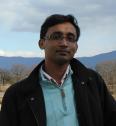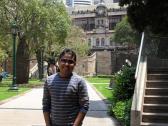Scientific Bangladesh, in its pursuit, to give Bangladeshi researchers at home and in abroad scope to talk about their present research, future plan, giving directions to future researchers and government, has talked(by email) with Dr Muhammad Shamsul Alam.
Dr Alam is presently visiting fellow at National Cancer Institute at the National Institutes of Health, USA. He has applied for a patent for anti-cancer drug as part of his research group. He obtained his PhD from Japan and worked at ICDDR, B as a research officer and the University of Dhaka as Assistant professor. Dr Alam says that to develop Bangladesh, we must develop our Scientific research and technology.
Scientific Bangladesh: Recently you have filed a patent application for the anti-cancer drug. Congratulation for it. How much information can you share without readers at this stage about your discovery?
Dr Alam: Thank you. Studies of the past several years have put much focus on tumour microenvironment and its contribution to tumour growth and progression. In summary, inflammatory cytokines like TNFa or IL-17 induce angiogenesis, which helps to induce tumour growth in pancreas and breast etc. These two cytokines are also involved in metastasis. The drug we designed is a cell membrane permeable peptide, which functions specifically in T cells to inhibit inflammatory cytokine production. Reducing inflammatory cytokine production helps to inhibit tumour growth and tumour cell migration. I just can say at this point that it is a 26 amino acid peptide, which inhibits p38 (a member of Map Kinase family) alternative activation pathway in T cells to reduce inflammation.
Scientific Bangladesh: What made you interested in cancer research?
Dr Alam: Since my PhD program, I was involved in basic immunological research. I know a lot of diseases are associated with autoimmunity and inflammation like multiple sclerosis, rheumatoid arthritis, psoriasis and the more deadly disease cancer. Only in the United States, a total of 1,638,910 new cancer cases and 577,190 deaths from cancer are projected to occur in 2012. Although a lot of laboratories with very diversified field whole over the world are either trying to treat cancer or working to better understand the mechanism of cancer development and progression, the ultimate outcome to help patients are very disappointing.
When I moved to NIH, I was planning to work for this deadly disease and I came to know that pancreatic cancer is the most lethal cancer because it eludes diagnosis until a very advanced stage. Furthermore, it is resistant to all forms of cytotoxic chemotherapies and ionizing radiation. The current standard of care for advanced pancreatic adenocarcinoma is gemcitabine (a nucleoside analogue in which the hydrogen atoms on the 2’ carbon of deoxycytidine are replaced by fluorine atoms), which prolongs survival by only a few weeks. So, there is no effective therapy for this deadly cancer. Our drug is more effective than gemcitabine in all mouse models tested so far and most importantly it has no toxicity in vivo.
Scientific Bangladesh: What would you like to say about your present research organization?
Dr Alam: I would say in one word, amazing. NIH is a US governmental organization, where I have always dreamed of working. Research quality is extraordinary because of the presence of outstanding junior and senior scientists. Another most striking point in working here is, if you need any reagent or transgenic mice you can find somebody is having it within the campus and they are very cordial to share those reagents. I thank my mentor Dr. Jonathan Ashwell for giving me the opportunity to work at NIH and most importantly the freedom of work in the lab to make the project successful.
Scientific Bangladesh: What’s the global scenario of research on cancer, particularly anti-cancer drug?
Dr Alam: Thanks for the question. If you go to PubMed webpage and write the keyword “Cancer”, you will see more than 2.7 million paper appear. It means cancer research is growing day by day. But unfortunately, we don’t have good therapy for cancer. The research standard for cancer is in question globally. In last March, in Nature journal, a group has published a comment on questioning the standard of preclinical cancer research. They have collected 53 random journals of preclinical cancer research (including the journal with >20 impact factor) and then they tried to reproduce those key findings. Unfortunately, only data of 6 journals (11%) were reproduced. Here is the link for readers who are interested in:
http://www.nature.com/nature/journal/v483/n7391/full/483531a.html
This article suggested increasing the quality of cancer research. I think they are very true. If you proportionate the bench research cancer laboratories and the ultimate outcome of the therapy, it is not that satisfactory.
Scientific Bangladesh: What’s your knowledge/idea about cancer research in Bangladesh? Is it getting due priority?
Dr Alam: Sincerely, no idea.
I think except two or three research centre, research is not the first priority in any place in Bangladesh. This is because there is no encouragement for research. Unlike foreign universities, if you go to any public universities in Bangladesh, all executive posts like VC, Pro-VC, Dean, and Provosts are political. There is no appreciation for good scientists. Appreciation and environment are very important to promote anything in any place. Universities should take initiative to build scientists and should provide laboratory space, especially for young teachers to work there.
Scientific Bangladesh: If Bangladesh govt ask you for suggestions in regard to cancer research, how would you suggest?
Dr Alam: Not particularly in cancer research, to develop research in Bangladesh, please make at least only one research institute with world class standard. Building world-class facilities are not enough; make sure that the institution will be running. Science is global. Doing low standard research with limited facilities doesn’t help. Globally, nobody cares about your limitations; people care about your outcome. Recruiting good scientists and making collaboration with international organizations will help. The government should allocate money for the Center every year. A scientific body must monitor the work regularly. Scientists should be recruited based on their records like publications, research background etc. Encourage young scientist working outside to come back to home country and work in that centre. It will help in many different ways like research will develop, brilliant young guys, will find a way to go back to the homeland and serve for the country and off-course job scope will be created.
Scientific Bangladesh: What would be your suggestions for those who want to build their scientific career in cancer research?
Dr Alam: Fresh graduates usually make a mistake during their PhD entrance. Most of them just want a fellowship as soon as they graduate. They apply to many scholarships and once they get one they instantly decide to go there. Somebody even chooses a country to do a PhD at first. Starting a PhD in such a hurry is a big mistake. I would suggest, when you decide to do a PhD, go online and look for a potential lab in terms of publication quality, not quantity. Try to communicate to those labs to get entry. Even if it takes a longer time than usual but training in such laboratories can make you different.
Scientific Bangladesh: Would you like to say something more for which we could not ask the appropriate question?
Dr Alam: Building a nation is not about buying technology from outside. It is all about the development of science and technology in your own country. If science and technology develop, the country will develop eventually. We should find our problems in the first priority and then design project accordingly and give the project to somebody who is experts with current technology and obviously are capable of doing that. Initially, the govt. should provide fund for that and once it becomes well known globally then fund from external sources will be available. It will help to develop the country.
Scientific Bangladesh: Thanks for your time and valuable comments.
Dr Alam: Thanks Scientific Bangladesh for asking and giving scope to share my thinking.


